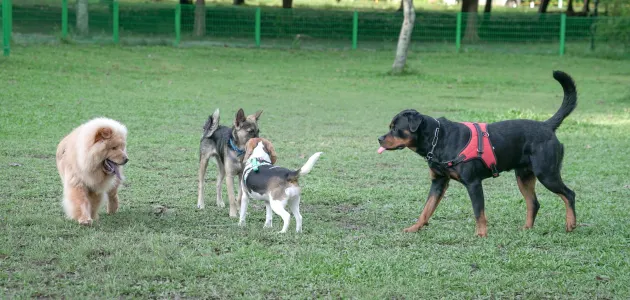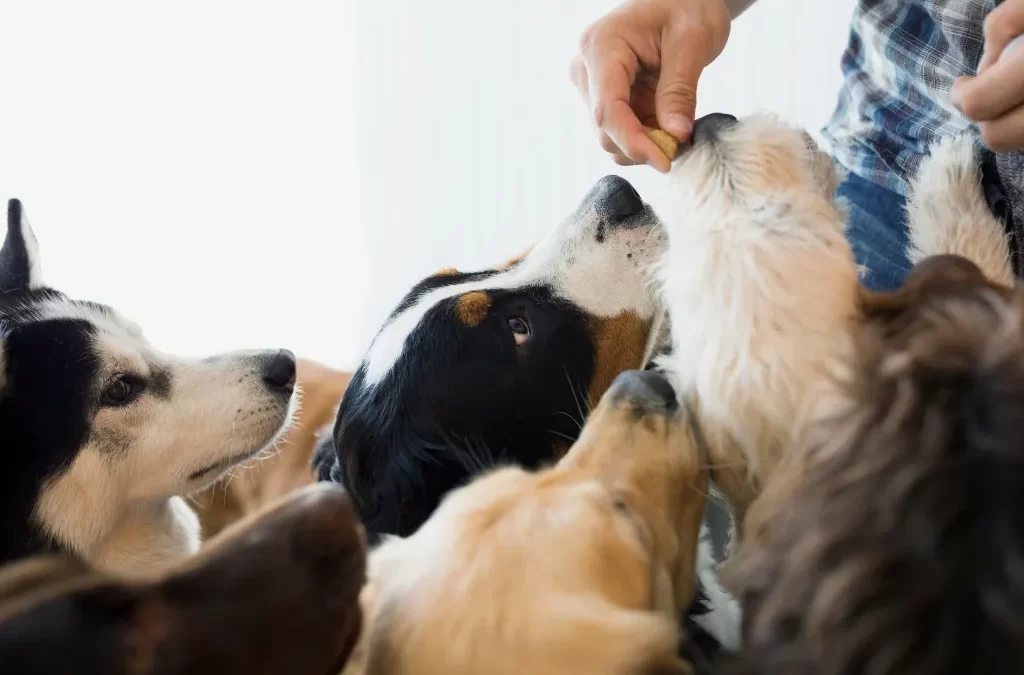Dog daycare isn’t just a solution for busy pet parents—it’s a cornerstone for cultivating better behavior in your furry friend. With the guidance of trained professionals and the company of other dogs, your pet can learn the ropes of good manners in a way that sticks.
Daycare provides a unique setting where dogs can learn social cues and acceptable behaviors in a controlled, supervised environment, which is essential for dogs who are still learning how to interact with their world.
Socialization

Socialization is a fundamental aspect of a dog’s development, akin to children learning to interact in a school setting. In a daycare environment, your dog will meet a variety of breeds, each with their own unique body language and play styles. Here’s how this diversity benefits your pet:
Exposure to Different Breeds
Just like humans, dogs communicate differently. A daycare setting introduces your dog to the nuanced ways different breeds interact, helping your pet understand and respond appropriately to a range of social cues.
Understanding Size and Space
Interaction with dogs of varying sizes teaches your dog how to respect personal space and play safely. Smaller breeds often require gentler play, while larger breeds can handle a more robust style. Daycare helps your dog to adapt its play style to its playmates, promoting safety and enjoyment for all.
Temperament Testing
Dogs, like people, have different personalities. Some are outgoing, while others are shy. Daycare allows your dog to meet diverse temperaments, teaching them to be patient with more reserved dogs and respectfully energetic with more outgoing ones.
Learning Pack Dynamics
Dogs are pack animals by nature, and daycare offers a pack-like experience where dogs learn to form hierarchies, understand leadership, and find their place within a group. This experience is invaluable in teaching them how to interact socially in both the canine and human world.
Building Patience and Gentleness
Through repeated exposure to various dogs, your pet learns to be patient as not every dog wants to play immediately or in the same way. Your dog also learns to be gentle, especially with smaller or younger dogs, which is a skill that can translate to being gentle with humans, particularly children.
Human Interaction
Daycare isn’t just about interacting with other dogs; it’s also about forming positive relationships with humans. Your dog will learn to trust and follow instructions from daycare staff, which reinforces obedience and manners.
Preventing Behavioral Problems
A well-socialized dog is typically a well-behaved dog. Regular interaction with a diverse group of dogs can prevent the development of fears, phobias, and aggression towards other dogs and people.
Routine

Routine is the basis upon which a dog’s confidence and predictability are built. A regular schedule at dog daycare serves to establish a framework of expectations for your dog, which translates into better behavior.
Scheduled play sessions provide a safe outlet for energy and encourage positive behavior. Dogs begin to understand that there is a time for play, which can reduce hyperactive tendencies at home.
By alternating between activities and rest, dogs learn to appreciate downtime. Regular rest periods can help mitigate issues with hyperactivity and anxiety, teaching dogs to be calm and settle down after activity.
Regular meal times at daycare teach dogs patience and can help regulate their metabolism. This can ease the stress associated with feeding times at home and help prevent food-related aggression or anxiety.
Incorporating training sessions throughout the day reinforces commands and good behavior. This consistency helps dogs understand what is expected of them, both at daycare and at home.
Regular contact with daycare staff establishes a routine of human-led activities, reinforcing the dog’s respect for and responsiveness to human direction.
Scheduled interaction with other dogs builds a routine around social behavior, helping dogs to be consistently well-mannered around others.
Many daycares perform regular health checks to monitor for any issues, which teaches dogs to be comfortable with handling and can lead to early detection of health concerns.
Daycare often introduces controlled environment changes, such as new toys or obstacle courses, which can help dogs learn to adapt to new situations calmly and confidently.
Training Reinforcement

Daycare environments are not just for play and socialization; they are also fertile grounds for reinforcing training principles. Daycare can act as an extension of your dog’s training regimen.
Repetition of Commands
Daycare staff can use common commands like ‘sit,’ ‘stay,’ ‘come,’ and ‘down’ throughout the day. This repetition ensures that these commands become second nature to your dog, helping them respond more reliably over time.
Consistency Across Environments
By practicing trained behaviors in both the home and daycare settings, your dog learns that commands should be followed regardless of location. This consistency is critical for training to be effective and long-lasting.
Distraction Training
Daycare provides a dynamic environment full of distractions. Learning to follow commands amidst other dogs, people, and new stimuli is excellent practice for real-world obedience.
Positive Reinforcement
Many daycares employ positive reinforcement techniques, rewarding good behavior with treats, praise, or playtime. This reinforcement helps dogs make a positive association with obeying commands and exhibiting good manners.
Behavioral Correction
When a dog exhibits undesirable behavior, daycare staff can immediately address the behavior according to training protocols. This immediate correction helps dogs learn which behaviors are unacceptable.
Social Cue Learning
Dogs are adept at reading and responding to the behavior of other dogs. In a daycare setting, dogs can learn from watching how their peers respond to commands and correct behavior.
Handling and Grooming Compliance
Regular grooming and handling by daycare staff can reinforce a dog’s training to be calm and compliant during grooming sessions or veterinary visits.
Crate Training and Quiet Time
Many daycares incorporate crate time or designated quiet times into their daily routine, which can help reinforce a dog’s crate training and encourage calm behavior when needed.
Regular daycare attendance can lead to a happier, more well-adjusted, and better-behaved dog at home, making your bond with your pet stronger and more enjoyable.
If you are looking for daycare or boarding the Milwaukee, WI area contact us today at 262-202-8202.

